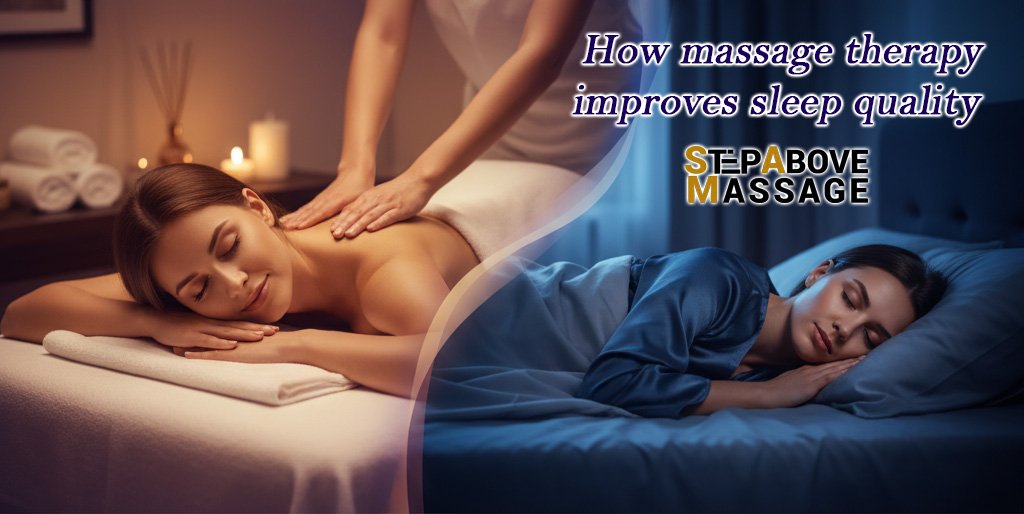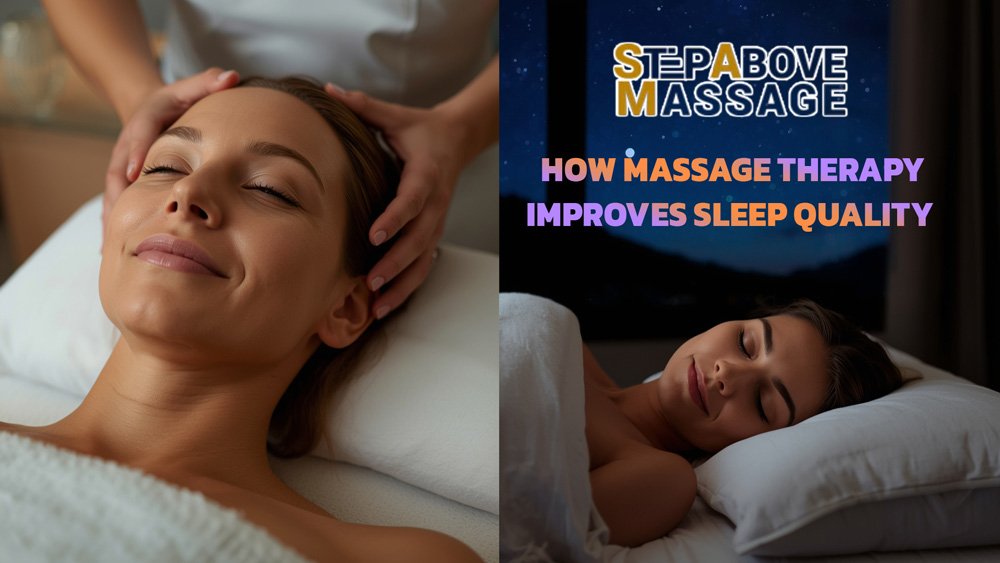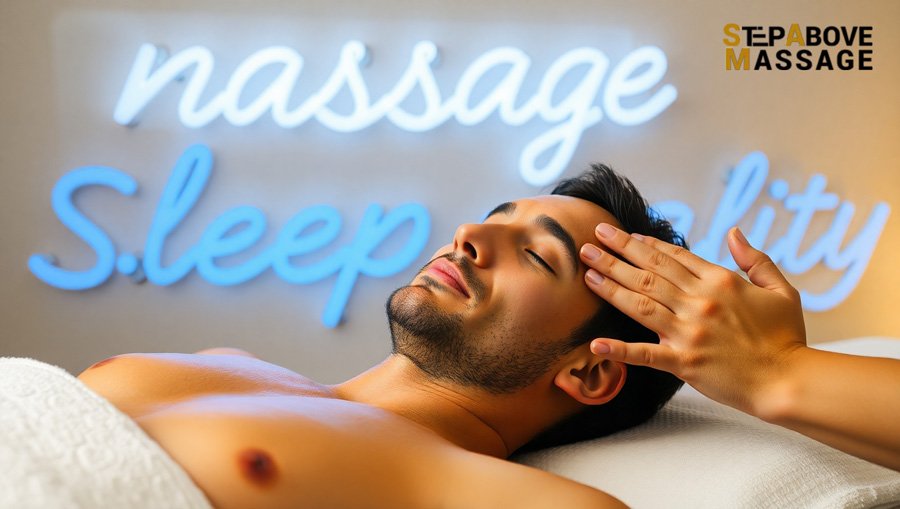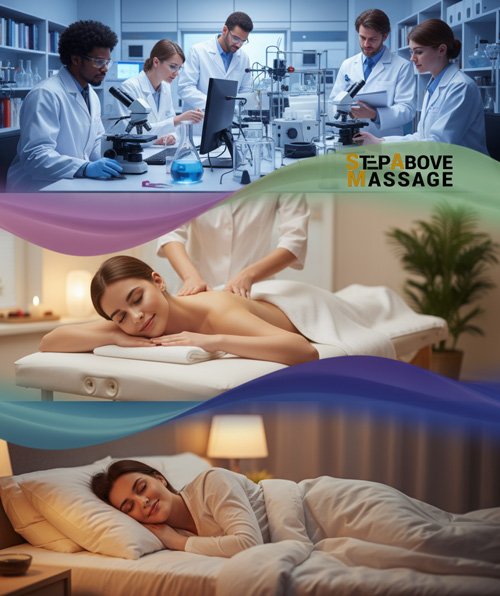
In today’s fast-paced world, quality sleep often feels like a luxury rather than a necessity. Millions struggle with insomnia, restless nights, and fatigue that lingers into the day. While many turn to medications or lifestyle changes, an ancient practice is gaining modern recognition for its role in promoting better rest: massage therapy. Massage therapy involves the manipulation of soft tissues to relieve tension and enhance well-being. Emerging research highlights its potential to transform sleep patterns. This article explores how massage achieves this, drawing on scientific insights and practical advice. By understanding the mechanisms at play, you can see why incorporating massage might be the key to unlocking deeper, more restorative sleep.
Table of Contents
ToggleUnderstanding Sleep Quality
What is Sleep Quality?
Sleep quality refers to how well you rest during the night, beyond just the hours spent in bed. It encompasses factors like how quickly you fall asleep, the depth of your slumber, and whether you wake up feeling refreshed. Good sleep quality involves cycling through stages, including light sleep, deep sleep, and REM (rapid eye movement) phases. Disruptions in these cycles can lead to grogginess and impaired daily function. Experts measure sleep quality using tools like the Pittsburgh Sleep Quality Index, which assesses habits and disturbances. High-quality sleep supports immune function, mood stability, and cognitive performance, making it a cornerstone of overall health.
Common Issues Affecting Sleep
Many factors hinder sleep quality, from stress to physical discomfort. Chronic anxiety keeps the mind racing, preventing relaxation. Pain from conditions like arthritis or muscle strains interrupts rest, causing frequent awakenings. Lifestyle elements, such as irregular schedules or excessive screen time, also play a role in disrupting sleep patterns. Hormonal imbalances, particularly in older adults, can exacerbate these issues, leading to persistent sleep challenges. Poor sleep creates a vicious cycle, worsening health problems and reducing quality of life. Addressing these root causes is essential for meaningful improvement in rest and recovery.
The Science Behind Massage Therapy
Physiological Effects
Massage therapy works by targeting the body’s musculoskeletal system through kneading and stroking, which reduces muscle tension and promotes blood flow. This increased circulation delivers oxygen and nutrients to tissues, aiding recovery and flushing out toxins that accumulate from daily stress. On a neurological level, massage stimulates sensory receptors, sending signals to the brain that encourage relaxation, lowering heart rate and blood pressure to create a calm state conducive to sleep. Studies show that even short sessions can trigger these responses, making massage a non-invasive way to prepare the body for restful slumber.
Hormonal Changes
One of the most significant effects of massage is its impact on hormones. It decreases cortisol, the stress hormone that keeps you alert and anxious, while boosting serotonin and dopamine levels. Serotonin is a precursor to melatonin, the hormone that regulates sleep-wake cycles, helping the body transition from wakefulness to drowsiness. Research indicates that regular massage can sustain these hormonal benefits, leading to long-term improvements in sleep quality. In postmenopausal women, for instance, massage has been linked to better sleep by balancing hormones disrupted during menopause, offering a natural solution to sleep disturbances.
Benefits of Massage for Sleep

Reducing Stress and Anxiety
Stress is a primary culprit in sleep disturbances, keeping the mind active when it should be winding down. Massage therapy counters this by activating the parasympathetic nervous system, which promotes the “rest and digest” mode, allowing muscles to relax and mental tension to ease. Clients often report a sense of peace post-session, which carries over into bedtime, making it easier to fall asleep. Anxiety reduction is particularly notable in those with generalized anxiety disorder, as massage lowers perceived stress and breaks the cycle of worry that fuels insomnia, fostering a calmer mindset for better rest.
Alleviating Pain
Chronic pain, whether from fibromyalgia or back issues, disrupts sleep by causing frequent awakenings. Massage addresses this by targeting sore areas, improving flexibility, and reducing inflammation, providing relief that can last for hours or days. For those with chronic conditions, therapeutic massage offers a drug-free alternative to pain management, avoiding side effects like drowsiness from medications. By improving comfort, massage allows for uninterrupted sleep cycles, directly correlating with better sleep duration and quality, and enhancing overall physical well-being.
Improving Circulation
Poor circulation can lead to discomfort, such as cold extremities or restless legs, that interferes with sleep. Massage enhances blood flow, warming the body and easing these symptoms, while also supporting oxygen delivery to the brain to foster a relaxed state. This is particularly beneficial for those with circulatory issues. Enhanced flow aids in nutrient absorption and waste removal, contributing to bodily recovery during sleep. Regular sessions can make circulation improvements a habit, supporting consistent rest and reducing nighttime disturbances caused by physical discomfort.
Types of Massage That Aid Sleep

Swedish Massage
Swedish massage, one of the most common types, uses long strokes and gentle kneading to promote relaxation, making it ideal for beginners seeking stress relief. It focuses on surface muscles, creating an overall sense of calm that is particularly effective for stress-related insomnia. Sessions typically last 60 to 90 minutes, leaving you in a serene state perfect for bedtime. Many find that Swedish massage helps them fall asleep faster due to its soothing, gentle nature, making it a popular choice for sleep improvement.
Reflexology
Reflexology targets pressure points on the feet, hands, and ears, which correspond to various body organs. Foot reflexology, in particular, has shown promise for improving sleep, especially in critically ill patients, by balancing energy and reducing tension. Studies indicate it enhances subjective sleep quality, such as perceived depth of sleep. As a focused approach, reflexology sessions are often shorter than full-body massages, making it an accessible option for those with specific sleep disorders or limited time.
Hot Stone Massage
Hot stone massage incorporates heated stones placed on key body points, with the warmth penetrating muscles to enhance relaxation. This technique is excellent for melting away deep tension that can linger and affect sleep, while the heat boosts circulation and eases joint stiffness. Research suggests it improves sleep depth and reduces awakenings, offering a luxurious option for those seeking profound rest. Combining heat with massage amplifies hormonal benefits, making it a powerful tool for better sleep quality.
Evidence from Studies
Clinical Trials
Numerous clinical trials support massage’s role in improving sleep. One study on postmenopausal women found significant enhancements in sleep patterns after regular massage therapy, with participants reporting better quality of life and reduced insomnia symptoms. The intervention involved consistent sessions over weeks, demonstrating the power of sustained therapy. Another trial with critically ill patients showed that foot reflexology improved sleep quality over two nights, with notable increases in subjective measures like sleep depth, providing robust evidence for massage’s efficacy.
Self-Reported Improvements
Beyond clinical trials, self-reports from surveys reinforce massage’s benefits, with over 75% of recipients noting reduced fatigue and better sleep. In wellness contexts, people describe feeling more rested, energetic, and focused after sessions, with general improvements in mood. These consistent anecdotal reports align with scientific data, broadening massage’s appeal as a sleep aid. Long-term users frequently cite sustained sleep improvements as a key reason for continuing therapy, highlighting its practical impact on daily life.
Scientific Evidence on Massage’s Impact on Sleep and Hormones
Scientific research has shown that massage therapy can significantly influence sleep by reducing cortisol (the stress hormone) and increasing serotonin and dopamine, which are critical for relaxation and sleep quality. A well-regarded study published in the International Journal of Neuroscience explored these hormonal changes in detail. You can read more in this scientific study on massage and sleep-related hormones.

Conclusion
Massage therapy offers a natural, effective path to better sleep quality by addressing core barriers like stress, pain, and hormonal imbalances. From Swedish to hot stone techniques, the variety of options allows for personalization to suit individual needs. Backed by clinical trials and consistent self-reported improvements, its benefits are clear and accessible. Incorporating massage into your routine, whether through professional sessions or self-massage, could transform your nights, leaving you waking up refreshed and ready. In a world full of sleep aids, this timeless therapy stands out for its holistic, drug-free approach. Explore it, and discover the profound impact it can have on your rest and overall well-being.
Common Questions
1. Can massage therapy help with insomnia?
Massage therapy can reduce insomnia by lowering stress and promoting relaxation, helping you fall asleep faster and improve sleep quality.
2. What type of massage is best for better sleep?
Swedish massage is highly effective for sleep, as its gentle, long strokes reduce tension and calm the nervous system, preparing the body for rest.
3. How often should I get a massage to improve sleep?
Weekly massages are recommended initially to improve sleep patterns, with bi-weekly sessions sufficient for maintenance once benefits stabilize.
4. Does massage help with sleep apnea?
Massage may alleviate sleep apnea symptoms by reducing stress and muscle tension, but it’s not a cure. Consult a doctor for comprehensive treatment.
5. Can self-massage improve sleep quality?
Yes, self-massage using techniques like hand strokes or foam rollers can relax muscles and reduce stress, promoting better sleep at home.
